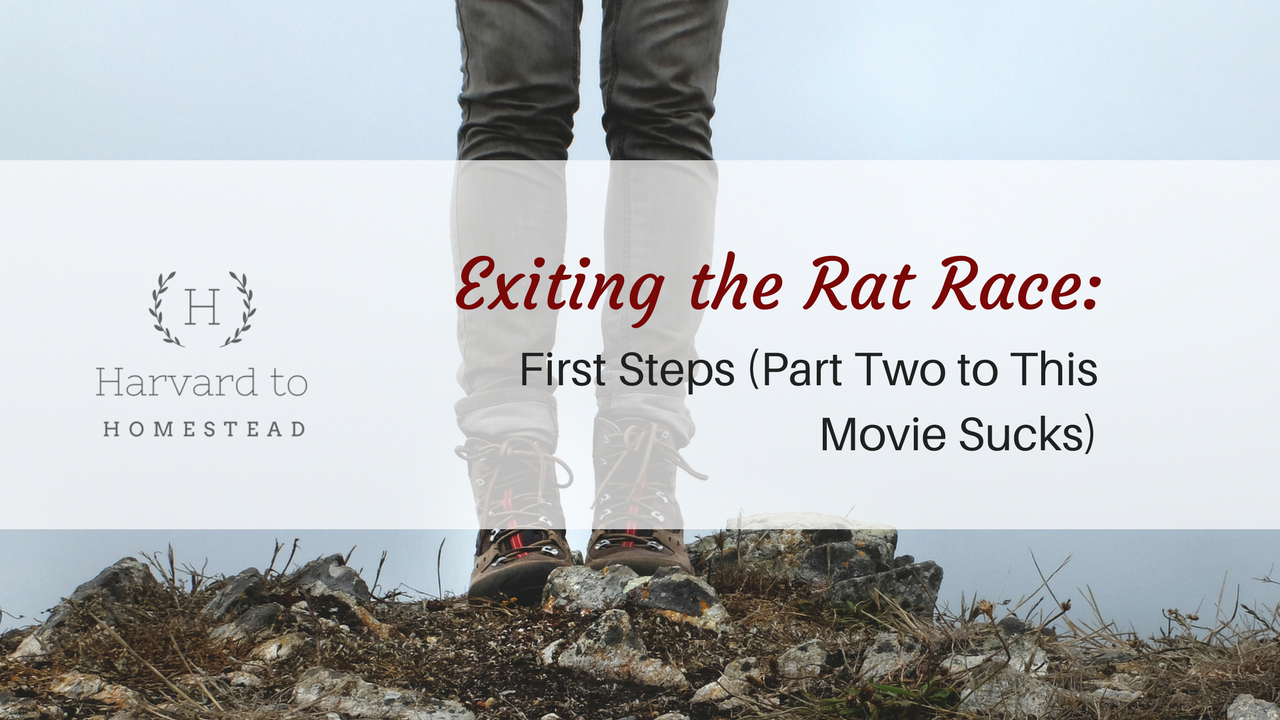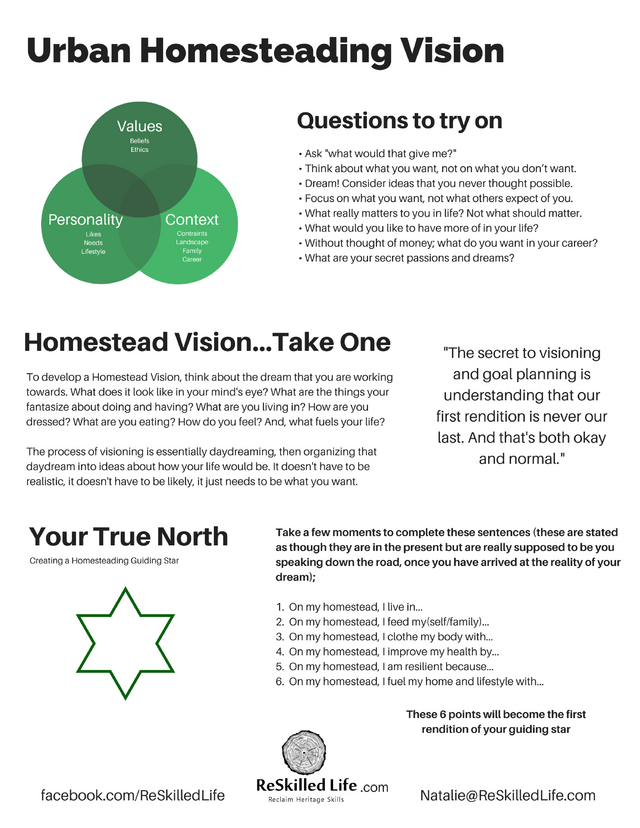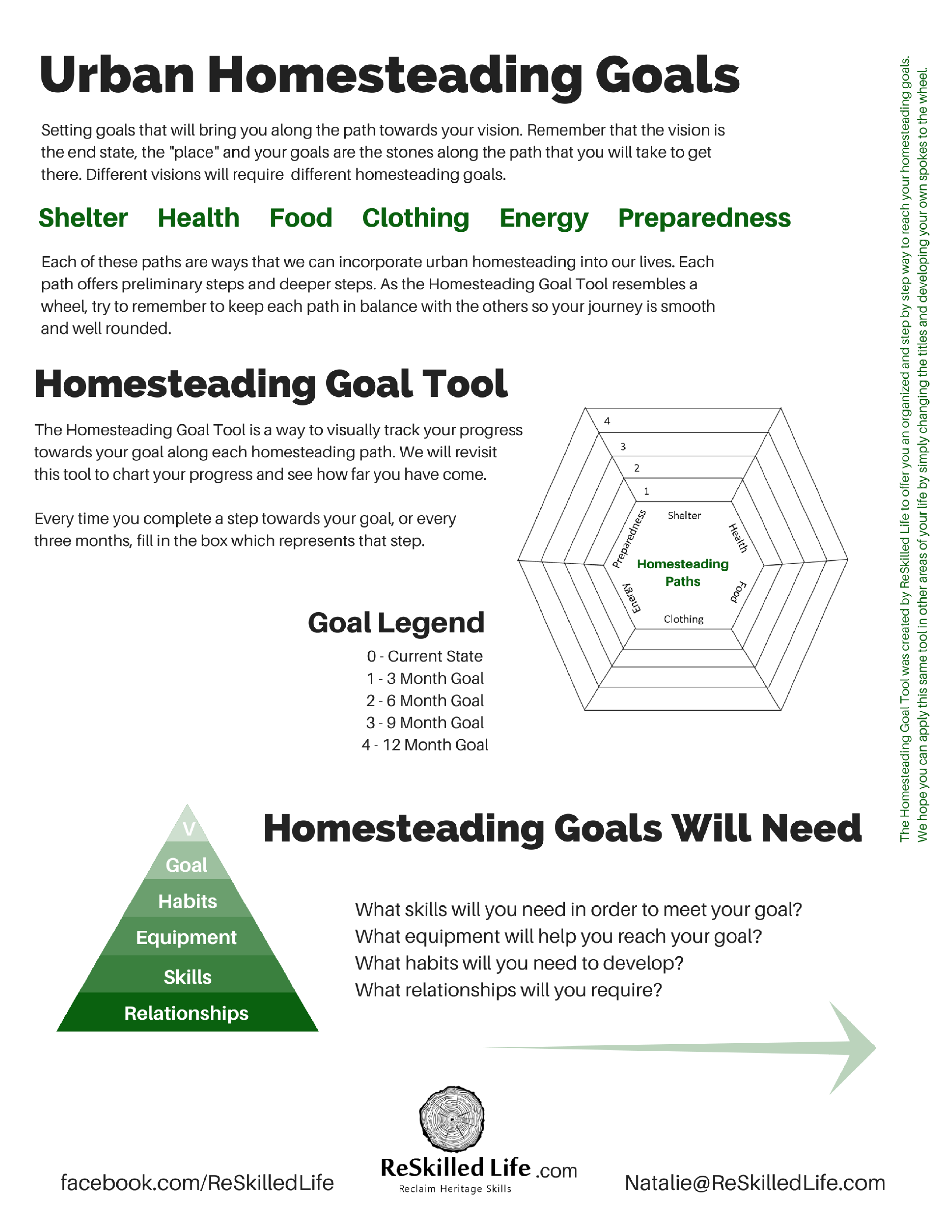Exiting the Rat Race: First Steps (Part Two to This Movie Sucks)

We all have our reasons for wanting a simpler life. For some, we see the illness of the consumer driven modern focus and we seek a slower life filled with quality not quantity. For others it’s the desire to get away from debt. And yet for others, it is a desire to be closer to the land…and for most of us it’s all of the above.
Regardless of our motivations, looking for the exit from this bad movie we’ve been watching and this pre-written script we’ve been following can happen in one of two ways. First, you can sell everything, buy land (or find some to live on) and start homesteading…learning as you go. To be honest, this route is filled with very important lessons about letting go of what doesn’t matter. Like a sudden fasting state, starving all of your old ways of being and old expectations by not giving them any sense of familiarity or comfort, you will see all of the most meaningless parts of your previous life fall away. Coffee at Starbucks really really doesn’t matter anymore. At all. However, other things become even more important than you once knew them to be, like working as a team with your family. This approach is dramatic, and there is a chance it will be so foreign and uncomfortable that you will rebound right back to that life you were exiting.
The second route is a bit more subtle, but has its own dangers. Rather than jumping in (finding the exit and running straight for it without peeking outside first), you can choose to prepare yourself for the transition. You can begin to assess the skills, equipment, relationships and mindsets that you will need in order to succeed after closing the door on the rat race life. This approach allows you to make use of any current comforts to begin to equip yourself with what you will need once you begin to take responsibility for your own life. The potential trap in this approach is getting into an endless cycle of always needing more and more preparation and never taking the final steps of opening the door and walking out of the old and into the new.
In the end, I think most of us settle somewhere between these two approaches, we prepare in what ways we can, then we take the leap.
It’s possible that as reading this you are at the point where you are already living a homesteading lifestyle and learning that this is an ever deepening spiral towards becoming fully responsible for your own life. It is also possible that you are the very first tentative stages of recognizing that you would like to stop following the script, and want a more connected life.
Either way, I recommend a continually assessing where you are, what kind of life you are striving for, and how will you know when you have arrived there (creating metrics for success). Then, you can start to create goals regarding the skills you need to gain, the equipment you need to acquire, the relationships you need to develop and the mindsets that you need to cultivate in order to reach those goals.
This is the process that I developed for an Urban Homesteading Program that I am leading this year. Each participant in the 2018 cohort of homesteading hopefuls are asked to create their homesteading vision then to break it down into vision statements about each of the following areas;
- On my homestead, I live in...
- On my homestead, I feed my (self/family)...
- On my homestead, I clothe my body with...
- On my homestead, I improve my health by...
- On my homestead, I am resilient because...
- On my homestead, I fuel my home and lifestyle with...
These areas, or pathways towards resiliency, offer us an opportunity to look at which parts of our lives are currently most out of alignment with the life we seek, and to chart a path forward to inch us closer and closer to the life we dream of.
Within each of these areas, participants then create a major goal, and for each goal they are asked to divide that into three steps or smaller goals that work together towards reaching that goal. Finally, for each step or smaller goal, they list the skills, equipment, relationships and habits they will need at each step. They are then asked to revisit this visioning and goal setting exercise every 3 months to see what progress they have made towards their goals.


Here is an example.
If I have the goal statement of “In my life, I clothe myself with clothing that I have made myself, that is beautiful and comfortable”, then I might create the major goal of learning how to sew a pair of pants, and knit a sweater.
This major goal could then be broken down into smaller goals or steps towards my goal. In this example these steps might be to learn to use a sewing machine, to learn to knit, and to have sources for fabric and wool that match my values. I would then list the skills, equipment, relationships and habits that I need for each of these smaller goals. For example, for learning to use a sewing machine I would need to acquire a sewing machine to learn on. This may not mean buying one, but perhaps could mean borrowing one. I would need to develop a relationship with someone who could mentor me, I would need to find patterns and tutorials, and I would need to acquire some materials to practice with.
Most of us go through the process of goal setting, dividing it into smaller steps, and listing off the things we need at each step quite naturally. However, there is a magic in keeping track of it…for two reasons. First, it helps us stay organized and gives us a record to look back at to track our progress. And second, it offers us a reminder to celebrate our successes and to document our struggles and lessons learned.
With only 63 days left until I move off grid, my major goals are;
• To complete the Hempcrete Haywagon House
• To install a driveway
• To build enclosures for all of my animals on the new land
• To develop a functioning water management system that will get me through until fall when we dig in the cistern.
I will be sharing my visioning and goal setting process for these major goals in my upcoming posts.
No matter where you are now, where you are starting from and where you are headed, I issue the challenge to you to create a set of goals in each of these areas to build resiliency in your life and begin living on purpose.
I wish you much success as you take steps towards your goals.
From my home fire to yours, hai hai.

Two hugs for two things!
Its a journey into your soul. I took a sudden swan dive in, after skill building and dreaming for 20 years. Its been a heck of an ride!!!
2). Your program fascinates me... Here in my community I have for two summers watched homesteaders come...and I'm comfortable saying 60% of them go...
I've taken it on as a pet project interest, this year is about gathering raw data and talking to folks, then I wish to create a helpful something for these folks. I've studied wholistic management and bits of that will be included. I will be reading again when not so tired.
Very interested ;)
I'm so glad this resonated with you! How wonderful that you are incorporating holistic management! What an amazing tool. Knowing how to make effective decisions on the homestead is so important. I'm very excited to hear what you gather!
Grateful to have the collective wisdom of the Homesteaders of Steemit as a back pocket resource!
Community matters, near or far.
Hugs!
This is so beautifully written. I resonate a lot with this. I exited the rat race around 3 years back when I quit a mainstream job. I've been trying to find my own way to navigate this life where I'm happy and at peace. For awhile I did my own brand of eco friendly design and finally came to the conclusion that being responsible for your own life is the most rewarding feeling. If I could be financially independent, could I extend that reach and claim responsibility in other parts of my life? It was that thinking that led me down the path towards homesteading. It's been a year now on that path and it's been challenging but also empowering. Your program seems amazing. I haven't been the most organized when it comes to plans and will have to take some time to answer those pertinent questions you ask.